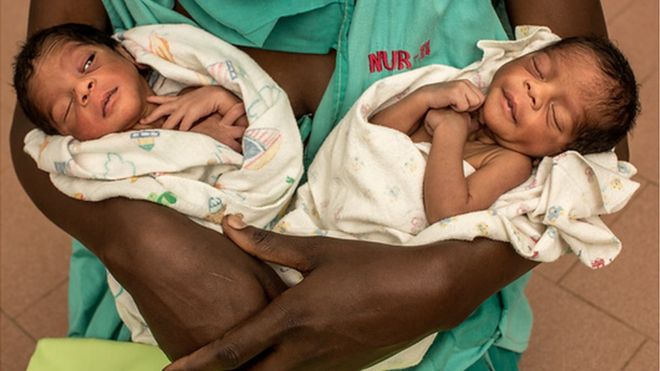
A Brief Colonial History Of Ceylon(SriLanka)
Sri Lanka: One Island Two Nations
A Brief Colonial History Of Ceylon(SriLanka)
Sri Lanka: One Island Two Nations
(Full Story)
Search This Blog
Back to 500BC.
==========================
Thiranjala Weerasinghe sj.- One Island Two Nations
?????????????????????????????????????????????????Friday, June 2, 2017
Twins in sub-Saharan Africa 'more likely to die' in early childhood

One in five children born as a twin in sub-Saharan Africa dies before
their fifth birthday, according to new research in the Lancet.
The study is the first to analyse death rates among twins in the region.
The report suggests improvements in survival for twins is lagging far behind other children.
The death rate among single-born children aged under-five halved between
1995 and 2014. For twins, the rate came down by a third.
'Poor fate'
Giving birth to twins is riskier than delivering just one baby - no matter which country a mother delivers in.
There is an increased risk of early delivery, low birth weight and mothers suffering severe blood loss.
But researchers say these risks are "compounded" by higher overall birth
rates and poor maternal and newborn care in sub-Saharan Africa, where
many mothers give birth at home.
In Finland for example - which has some of the best maternity care in
the world - researchers say for every 1,000 twins born, 11 die before
their first birthday.
According to the study, the equivalent figure for sub-Saharan Africa is 137 per 1,000 twins who die before they turn one.
And 213 in 1,000 die before their fifth birthday.

How common are twin births around the world?
Sub-Saharan Africa: 18 per 1,000 pregnancies
East Asia and Latin America: six to nine per 1,000 pregnancies
Europe, North America and the Middle East : eight to 16 per 1,000 pregnancies
Source: Lancet
'Special attention'
Researchers are calling for better health services to help these more vulnerable women and children.
Co-author, Prof Christiaan Monden from Oxford University, said: "So far, the poor fate of twins has gone largely unnoticed."
He said twin pregnancies needed to be detected earlier and mothers
should give birth in a hospital with staff trained in twin deliveries.
This should be followed by continued monitoring in the first few days and even months of their lives.
But this is a big ask in some of the poorest countries with some of the weakest health systems in the world.
Families, particularly those living in remote areas, often do not have hospitals anywhere near where they live.
Many cannot afford the transport to get to the nearest maternity facility, let alone pay for the care they need.
Even if they could, facilities such as specialist twin delivery care are few-and-far-between in many developing countries.
Prof Monden added: "It is very easy to say mothers should just give
birth in a nice hospital, but that is not a realistic option for many.
"What surprised us when we found the higher death rate among twins is we
thought this must be well-known by big UN organisations and that they
pay special attention to twins - but this is not the case."
Co-author, Dr Jeroen Smits, from Radboud University Nijmegen in the
Netherlands, said: "Without special attention to this vulnerable group
it will be very difficult to achieve the UN's sustainable development
goal target of fewer than 12 per 1,000 neonatal deaths and fewer than 25
per 1,000 under-five deaths by 2030."
Numbers behind the study:
The report used data from 1.69 million children born in 30 sub-Saharan African countries between 1995 and 2014
It included more than 56,000 twins.
16,399 twins died before their fifth birthday.


